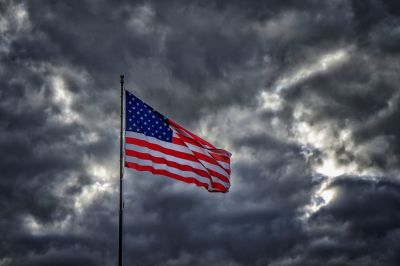The steamrolling of nations: The fall of America? (pt 2)

How do nations, their cultures, societies, and even civilizations get “steamrolled and distorted beyond recognition?
How can a nation born out of the Great Awakenings get steamrolled to the point that it does not ask, “Will there be mass violence today?” but “Where will there be mass violence today?” How did a nation that once publicly as well as privately celebrated its biblical roots be steamrolled to the point that one of its popular songs is titled, “unholy,” played midst dance celebrating Satan?
READ: The steamrolling of America: Satan and the consensus establishments (pt 1)
In part one, we looked at the role and impact of “consensus establishments,” the elites of information (tech). entertainment, academia, governance, and corporations and how they shape worldviews and values, and themselves steamroll society with glitz, as well as intimidation, condemnation, and elimination of those who refuse to conform.
Syndicated columnist Cal Thomas is describing the steamroller effect when he writes that such a society may appear to be free but is not free at all. “If your speech doesn’t fit with the spirit of the age, you will pay a price … Sometimes it can cost you your job … or your freedom … In a few you pay the price with your life.”
But this is not the first time in history that steamrolling a culture has occurred. It happened so much throughout history that a career British military officer and student of empires, Sir John Glubb, focused on changes in societies, how they are maneuvered, and the ensuing process that brings the collapse of nations and civilizations, and even provided a template for calculating the dates of a particular nation’s collapse.
Thomas has written an important book analyzing and applying Glubb’s theories to contemporary society in the United States. Thomas’s book is America’s Expiration date: The fall of empires and Superpowers and the Future of the United States (published by Harper-Collins).
Using Glubb’s methodology, Thomas forecasts the likely date for the fall of America (I won’t reveal his conclusion here). Glubb studied a 4,000-year span of history and found that the average life of empires is 250 years, hence the date projected by Thomas and found in his book.
Thomas quotes Glubb, who says that in his studies, “we seem to discover the same patterns constantly repeated under widely differing conditions…”
Glubb’s credibility was buttressed by the fact that he was proven correct for the nations he studied. Glubb discovered that there is a process of deterioration that could be calculated. The empires moved through certain stages:
- Age of Pioneers
- Age of Conquests
- Age of Commerce
- Age of Influence
- Age of Intellect
- Age of Decadence
“Everything that has happened around us Has happened again and again before,” concluded Glubb.
“As a journalist who has been commenting on our culture in a syndicated column for more than three decades, I can clearly see we have entered the Age of Decadence,” says Thomas.
There is also a process of stages of nations revealed in God’s dealings with ancient Israel, found in the Bible books of Joshua and Judges:
- Ratification: This is a period in a society when there is widespread consensus among important influencers and the people in general that God is the Lord of history and their nation.
- Relapse of Memory: Alexander Solzhenitsyn once asked an old peasant the reason for the tragedy of Russia. “People forgot God,” the old man replied. “A strong case can be made that when an empire or nation turns against God, it begins on a path of decline from which it is impossible to escape. That is found not only in Scriptural history but in virtually all history,” says Thomas.
- Rebellion: This stage is marked when belief and behavior are unleashed from absolute truth, and rebellion from old values and mores are on public display. “The major media in Hollywood and New York … are co-conspirators in our decline, and when they are criticized, they defend themselves by saying they are just giving the people what they want,” says Thomas.
- Refiner’s fire: In this stage, the hand of God that had restrained the consequences of rebellion is removed and chaos spreads.
- Remembrance: The situation becomes so bad that some in the society begin to ask: What have we lost?
- Repentance: Now the question is, how do we get back what we have lost? This marks an important turning point as widespread repentance occurs among believers and their churches.
- Revival: The manifestation of God’s forgiveness, healing, and refreshing spreads through the work of the Holy Spirit.
- Restoration occurs as there is the spreading renewal of the original consensus that God is the Lord of history and the nation.
Israel was distinct as God’s appointed covenant nation but is prototypical of His dealing with nations in general. In this cycle of repentance even now we can find hope because “God is not willing for any to perish, but for all to come to repentance” (2 Peter 3:9).
May we, our churches, our institutions, and the consensus elites lay hold of this hope before the decadence drags us into Hell itself. Cal Thomas’s book sounds the urgency of our moment in time.
Wallace B. Henley is a former pastor, daily newspaper editor, White House and Congressional aide. He served 18 years as a teaching pastor at Houston's Second Baptist Church. Henley is author or co-author of more than 25 books, including God and Churchill, co-authored with Sir Winston Churchill's great grandson, Jonathan Sandys. Henley's latest book is Who will rule the coming 'gods'? The looming spiritual crisis of artificial intelligence.



























